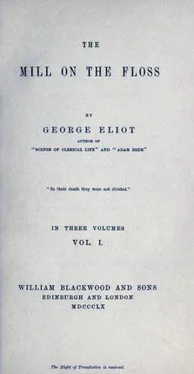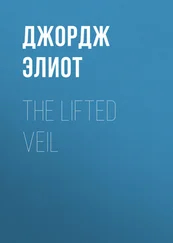And on the third day — this day of which she had just sat out the close — the letter had come which was lying on the table before her.
The letter was from Stephen. He was come back from Holland; he was at Mudport again, unknown to any of his friends, and had written to her from that place, enclosing the letter to a person whom he trusted in St. Ogg's. From beginning to end it was a passionate cry of reproach; an appeal against her useless sacrifice of him, of herself, against that perverted notion of right which led her to crush all his hopes, for the sake of a mere idea, and not any substantial good, — his hopes, whom she loved, and who loved her with that single overpowering passion, that worship, which a man never gives to a woman more than once in his life.
"They have written to me that you are to marry Kenn. As if I should believe that! Perhaps they have told you some such fables about me. Perhaps they tell you I've been 'travelling.' My body has been dragged about somewhere; but I have never travelled from the hideous place where you left me; where I started up from the stupor of helpless rage to find you gone.
"Maggie! whose pain can have been like mine? Whose injury is like mine? Who besides me has met that long look of love that has burnt itself into my soul, so that no other image can come there? Maggie, call me back to you! Call me back to life and goodness! I am banished from both now. I have no motives; I am indifferent to everything. Two months have only deepened the certainty that I can never care for life without you. Write me one word; say 'Come!' In two days I should be with you. Maggie, have you forgotten what it was to be together, — to be within reach of a look, to be within hearing of each other's voice?"
When Maggie first read this letter she felt as if her real temptation had only just begun. At the entrance of the chill dark cavern, we turn with unworn courage from the warm light; but how, when we have trodden far in the damp darkness, and have begun to be faint and weary; how, if there is a sudden opening above us, and we are invited back again to the life-nourishing day? The leap of natural longing from under the pressure of pain is so strong, that all less immediate motives are likely to be forgotten — till the pain has been escaped from.
For hours Maggie felt as if her struggle had been in vain. For hours every other thought that she strove to summon was thrust aside by the image of Stephen waiting for the single word that would bring him to her. She did not read the letter: she heard him uttering it, and the voice shook her with its old strange power. All the day before she had been filled with the vision of a lonely future through which she must carry the burthen of regret, upheld only by clinging faith. And here, close within her reach, urging itself upon her even as a claim, was another future, in which hard endurance and effort were to be exchanged for easy, delicious leaning on another's loving strength! And yet that promise of joy in the place of sadness did not make the dire force of the temptation to Maggie.
It was Stephen's tone of misery, it was the doubt in the justice of her own resolve, that made the balance tremble, and made her once start from her seat to reach the pen and paper, and write "Come!"
But close upon that decisive act, her mind recoiled; and the sense of contradiction with her past self in her moments of strength and clearness came upon her like a pang of conscious degradation. No, she must wait; she must pray; the light that had forsaken her would come again; she should feel again what she had felt when she had fled away, under an inspiration strong enough to conquer agony, — to conquer love; she should feel again what she had felt when Lucy stood by her, when Philip's letter had stirred all the fibres that bound her to the calmer past.
She sat quite still, far on into the night, with no impulse to change her attitude, without active force enough even for the mental act of prayer; only waiting for the light that would surely come again. It came with the memories that no passion could long quench; the long past came back to her, and with it the fountains of self-renouncing pity and affection, of faithfulness and resolve. The words that were marked by the quiet hand in the little old book that she had long ago learned by heart, rushed even to her lips, and found a vent for themselves in a low murmur that was quite lost in the loud driving of the rain against the window and the loud moan and roar of the wind. "I have received the Cross, I have received it from Thy hand; I will bear it, and bear it till death, as Thou hast laid it upon me."
But soon other words rose that could find no utterance but in a sob, — "Forgive me, Stephen! It will pass away. You will come back to her."
She took up the letter, held it to the candle, and let it burn slowly on the hearth. To-morrow she would write to him the last word of parting.
"I will bear it, and bear it till death. But how long it will be before death comes! I am so young, so healthy. How shall I have patience and strength? Am I to struggle and fall and repent again? Has life other trials as hard for me still?"
With that cry of self-despair, Maggie fell on her knees against the table, and buried her sorrow-stricken face. Her soul went out to the Unseen Pity that would be with her to the end. Surely there was something being taught her by this experience of great need; and she must be learning a secret of human tenderness and long-suffering, that the less erring could hardly know? "O God, if my life is to be long, let me live to bless and comfort—"
At that moment Maggie felt a startling sensation of sudden cold about her knees and feet; it was water flowing under her. She started up; the stream was flowing under the door that led into the passage. She was not bewildered for an instant; she knew it was the flood!
The tumult of emotion she had been enduring for the last twelve hours seemed to have left a great calm in her; without screaming, she hurried with the candle upstairs to Bob Jakin's bedroom. The door was ajar; she went in and shook him by the shoulder.
"Bob, the flood is come! it is in the house; let us see if we can make the boats safe."
She lighted his candle, while the poor wife, snatching up her baby, burst into screams; and then she hurried down again to see if the waters were rising fast. There was a step down into the room at the door leading from the staircase; she saw that the water was already on a level with the step. While she was looking, something came with a tremendous crash against the window, and sent the leaded panes and the old wooden framework inward in shivers, the water pouring in after it.
"It is the boat!" cried Maggie. "Bob, come down to get the boats!"
And without a moment's shudder of fear, she plunged through the water, which was rising fast to her knees, and by the glimmering light of the candle she had left on the stairs, she mounted on to the window-sill, and crept into the boat, which was left with the prow lodging and protruding through the window. Bob was not long after her, hurrying without shoes or stockings, but with the lanthorn in his hand.
"Why, they're both here, — both the boats," said Bob, as he got into the one where Maggie was. "It's wonderful this fastening isn't broke too, as well as the mooring."
In the excitement of getting into the other boat, unfastening it, and mastering an oar, Bob was not struck with the danger Maggie incurred. We are not apt to fear for the fearless, when we are companions in their danger, and Bob's mind was absorbed in possible expedients for the safety of the helpless indoors. The fact that Maggie had been up, had waked him, and had taken the lead in activity, gave Bob a vague impression of her as one who would help to protect, not need to be protected. She too had got possession of an oar, and had pushed off, so as to release the boat from the overhanging window-frame.
Читать дальше












